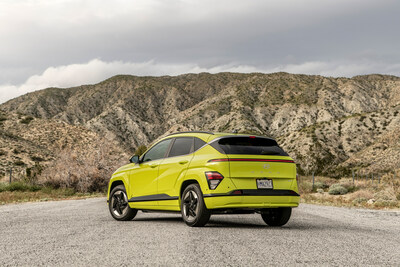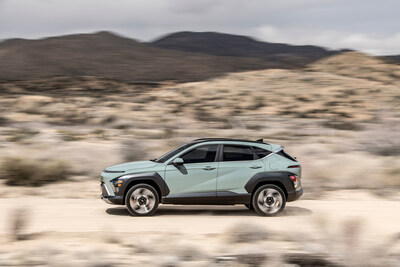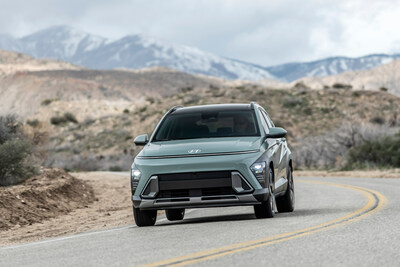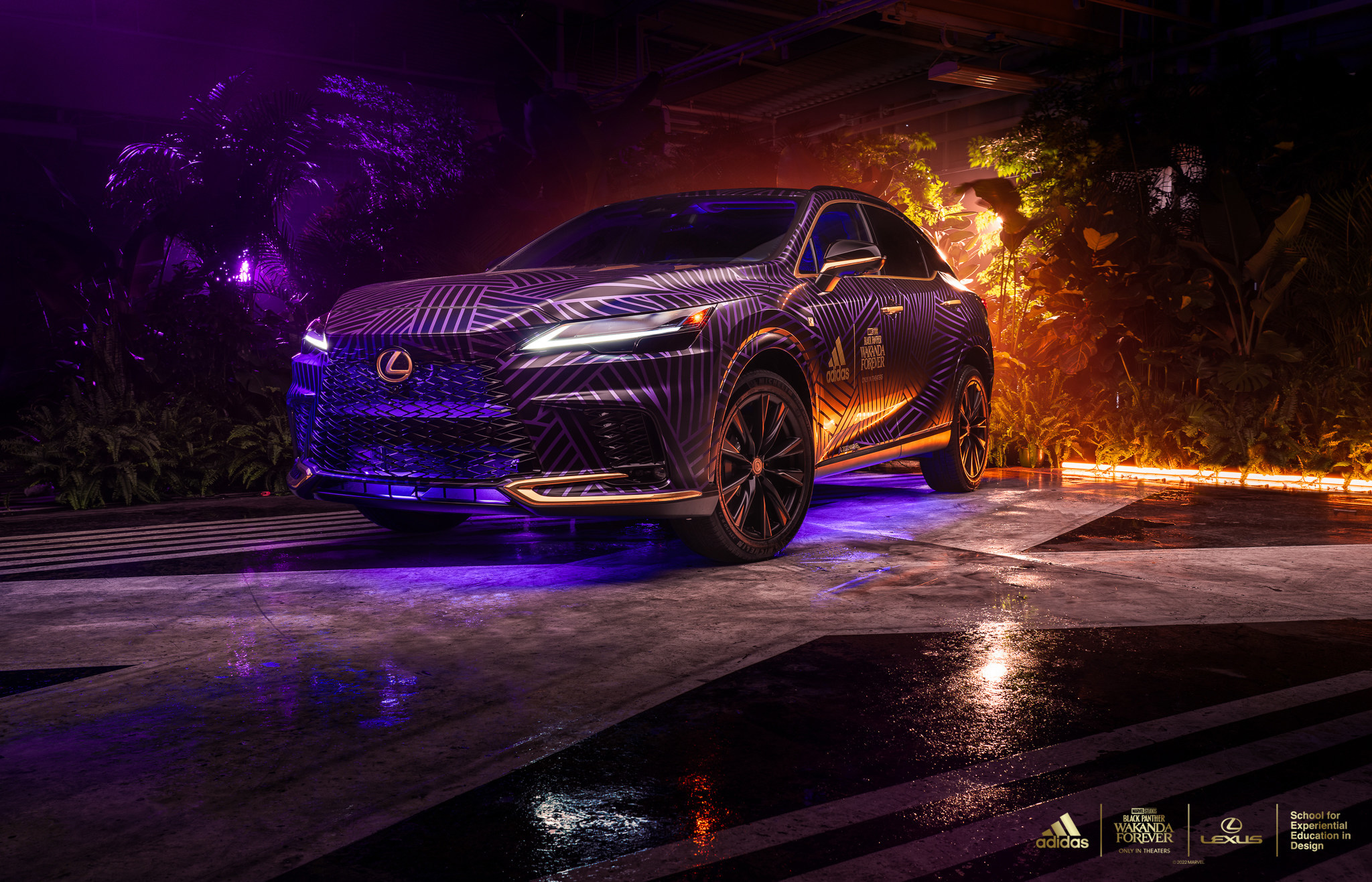All-New 2024 Hyundai Kona Revealed at New York International Auto Show

Hyundai today revealed the all-new 2024 Kona Electric, Limited, and N Line models in its North American debut at the New York International Auto Show. The all-new Kona is positioned as an upscaled multiplayer in the small SUV segment, led by an all-electric variant that offers advanced safety, convenience, and outstanding electric range of 260 miles based on preliminary Hyundai internal estimates. The second-generation Kona offers one of the most comprehensive product packages in the small SUV segment, including the widest range of powertrains. Customers can choose from electric and internal combustion powertrains, including a sporty N Line version. The all-new 2024 Kona will arrive at U.S. dealers this summer, and the Kona Electric will be available late fall.
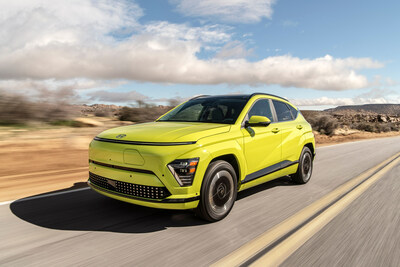
In an unconventional move, Hyundai developed the new Kona platform with an electrified powertrain first, in line with the company’s accelerated electrification strategy announcement that will bring 11 new Hyundai EVs to market globally by 2030.
“The all-new Kona and Kona Electric continue to build upon our extremely successful first-generation model, with outstanding efficiency, innovative technologies, distinctive styling, and comprehensive safety features,” said José Muñoz, president and CEO, Hyundai Motor North America. “The new Kona Electric represents the next step forward in eco-friendly mobility solutions, a key model in Hyundai’s rapid transition to clean mobility and progress for humanity.”
With its rugged, dynamic design and upscaled dimensions, the all-new Kona retains its iconic character, supporting active lifestyles for customers of all ages, while offering innovative technologies and convenience features that provide a safe, connected, and comfortable experience. Among the upgrades are dual, 12.3-inch panoramic display screens, Digital Key 2 Touch, Over-the-Air (OTA) software updates and Hyundai’s next-generation infotainment system.
Kona Electric, equipped with the 64.8-kWh battery, is estimated to deliver up to 260 miles of range based on Hyundai’s preliminary internal testing (ii). This battery system is internally estimated to recharge from 10 percent to 80 percent in approximately 43 minutes with available 400V fast-charging capability(iii). The standard battery is estimated to provide approximately 197 miles of range based on preliminary internal tests (iv).
The all-new model has unique proportions providing larger dimensions and interior volume. The Kona internal combustion version length is now 171.3 in., 5.7 in. longer, with a wheelbase of 104.7 in., a 2.3 in. increase, and its overall width is 71.9 in., a full inch wider than its predecessor.
EV-driven Exterior Design
For the 2024 Kona, Hyundai transitioned from a conventional ICE-to-EV platform development process and followed an EV-to-ICE development process, resulting in a futuristic, EV-centric exterior that accentuates the Kona’s unique look with an unexpected combination of sleek and rugged design.
With a drag coefficient of just 0.27, the new Kona Electric excels at aerodynamic performance without sacrificing style. Between the aerodynamic nose and rear liftgate, sculpted wheel arch armor and parametric surfaces add character to pure volume, with dynamic chrome lines connecting the belt line to the rear spoiler and integrated center high-mounted stop lamp. On the Electric variant, a Pixelated Seamless Horizon Lamp and Pixel graphics add a unique flourish. In addition, available vivid exterior colors further emphasize Kona’s iconic design, taking inspiration from the diverse lifestyles of a broad spectrum of customers.
2024 Kona Electric Specifications
Dimensions
| Wheelbase | 104.7 in. |
| Length | 171.5 in. |
| Width | 71.9 in. |
| Height (w/roof rails) | 62.2 in. (w/ 17-inch tires) |
| Headroom (w/out sunroof) | 39.9 (front), 38.3 in. (rear) |
| Leg room | 41.7 in., 36.4 in. (rear) |
| Shoulder room | 56.8 in. (front), 55.2 in. (rear) |
Cargo
| Trunk space | 25.5 cubic feet (SAE standard) |
| Front storage volume (frunk) | 27 liters (0.95 cu. ft.) |
Performance
| Maximum Driving Range (Hyundai internal estimate) | 260 miles (i) (internal estimate w/ 64.8 kWh battery)(final range to be confirmed at a subsequent date) | ||
| Performancew/ 64.8 kWh Battery | 2WD | Power | 150 kW (201 HP) |
| Torque | 255 Nm (188 lb.-ft.) | ||
| Performancew/ 48.6-kWh Battery | 2WD | Power | 99 kW (133 HP) |
| Torque | 255 Nm (188 lb.-ft.) | ||
| Supported Charging Infrastructure | Available 400V with 64.8 kWh Battery | |
| Charging | Approximately 10% to 80% in 43 minutes with fast-charging capability (iii) | |
| Vehicle-to-Load (vi) | Maximum Power Output | 1.7kW (North America) |
| Port Locations | Vehicle charging port access with V2L adapter | |
Roomier and More Versatile Interior
Based on the model’s upscaled dimensions and EV-derived universal architecture, Hyundai designed a larger interior ‘living space’ to embrace a wider range of customer lifestyles. The driver-centric front row is accentuated by a floating horizontal C-Pad with integrated, dual 12.3-inch panoramic display screens that affirm Kona’s high-tech character.
As part of Kona’s new ergonomic layout, the shift-by-wire gear selector has been relocated from the center console to a stalk behind the steering wheel, allowing more storage in the open console area. The layout emphasizes Kona’s larger, wider interior, providing a versatile and comfortable space for driver and passengers. This impression is further reinforced by the relocation of driver controls around the steering wheel, allowing a multi-use center console storage area with a rotational cupholder design. Ambient interior lighting options are also available that correspond to drive modes, acceleration, or to suit the mood of the driver. The front seats are 30 percent slimmer to maximize rear passenger legroom and the second row Curveless Bench Seat also enhances available space. Even more, a two-stage latching system allows rear seat reclining.
The fully foldable second-row seat and rear compartment provide 25.5 cubic feet of rear cargo volume with rear seatbacks up and 63.7 cubic feet with seatbacks folded down, along with improved loading convenience. Loading anything from luggage to shopping bags is made easier than ever with the available Smart Power Tailgate that enhances cargo space access.
EV-Specific Features
In addition to the Pixelated Seamless Horizon Lamp and Pixel graphics, Kona Electric offers even more features for an improved customer experience. Available battery preconditioning ensures secure charging and power performance in colder ambient temperatures. A new charging port door lamp helps ensure visibility at night.
Kona Electric also comes with distinctive elements, including forward “frunk” storage, active grille shutters, exterior Vehicle-to-Load (V2L) capability, i-PEDAL driving mode, and Smart Regenerative System that adjusts regeneration according to real-time traffic conditions.
With a bi-directional onboard charger, the Vehicle-to-Load (V2L) (vi) function can power devices or charge electrical equipment, such as electric bicycles, scooters, camping equipment, or even power necessities during a power outage. From the front charging port, devices and appliances can be plugged in using an available V2L adapter to use battery power when the car is parked.
The new i-PEDAL enables a one-pedal driving mode that allows drivers to accelerate, decelerate and stop using only the accelerator pedal when desired. The Smart Regenerative System automatically adjusts the levels of regenerative braking based on real-time data from forward traffic flow, optimizing regenerative braking system efficiency.
Refined and Efficient Internal Combustion Powertrains
Kona powertrain offerings have top efficiency levels as a key target. Kona offers a choice of two gasoline powertrains. A 2.0-liter 4-cylinder Atkinson engine produces an estimated 147 horsepower at 6,200 rpm and 132 lb.-ft. of torque at 4,500 rpm, paired with a Smartstream Intelligent Variable Transmission (IVT) for maximum efficiency (vii). The Atkinson cycle design maximizes the effective cylinder expansion ratio (compression stroke vs. power stroke) for greater efficiency.
N Line and Limited trims offer a 1.6-liter 4-cylinder direct-injected, turbocharged engine generating an estimated 190 horsepower at 6,000 rpm (vii) and 195 lb.-ft. of torque from 1,700-4,500 rpm for confident acceleration in city driving. Peak torque delivery starts at only 1,700 rpm and holds through 4,500 rpm, for low-RPM responsiveness in everyday driving conditions. The Kona 1.6L turbo engine couples to an eight-speed automatic transmission for outstanding efficiency with smooth, seamless shifting and brisk acceleration.
Responsive and Refined Chassis Tuning
Kona was developed with a focus on enhanced driving dynamics and responsive performance for a variety of urban and multi-surface driving conditions. The long wheelbase, short overhangs and wide track create a planted stance that results in exceptional agility in urban environments with enhanced linear stability and ride comfort. Kona internal combustion models feature a MacPherson strut front suspension with coil springs and a hollow stabilizer bar design. Kona AWD models feature a multi-link rear suspension with stabilizer bar and FWD models feature a refined torsion beam rear axle design. Kona Electric models feature a MacPherson strut front suspension with coil springs and a multi-link rear suspension.
Kona N Line Sporty Variant
The N Line model boasts bodycolor cladding, 19-inch N Line alloy wheels, N Line rear spoiler, dual-outlet exhaust tips, Bose premium audio, sport seating with red accents, aluminum sport pedals, N Line scuff plates, and black mirrors. In addition, aggressive, wing-shaped front and rear fascia designs emphasize a lower stance for an even sportier appearance.
2024 Kona (ICE) Dimensions
| Length | 171.3 in. (N Line 172.6 in.) | |
| Width | 71.9 in. | |
| Height (w/roof rails) | FWD: 17/18 in. wheels: 62.4 in., 19 in. wheels: 62.6 in. AWD: 17/18 in. wheels: 63.4 in., 19 in. wheels: 63.6 in. | |
| Wheelbase | 104.7 in. | |
| Headroom (without sunroof) | Front | 39.9 in. |
| Rear | 38.3 in. | |
| Legroom | Front | 41.7 in. |
| Rear | 38.2 in. | |
| Shoulder room | Front | 56.8 in. |
| Rear | 55.2 in. | |
Connectivity with Over-the-Air Updates
The all-new Kona takes connectivity to the next level with Over-the-Air (OTA) technology (viii) for software updates, allowing car owners to save time by having their cars updated with the latest software, providing a convenient, upgradable experience. OTA software updates will allow the owner to improve their Kona’s performance or experience new features using wireless communication. The Kona can improve overall vehicle performance and functions by updating the firmware of the various control units. OTA software updates also can be used for maps and multimedia software.
For even more convenience, the 2024 Kona offers Digital Key 2 Touch (ix), using near-field communication (NFC) on smart phones or smart watches, assuring an elevated level of security. The latest version of Hyundai Digital Key, Digital Key 2 Touch allows owners to leave their car key at home and use compatible smartphones to lock, unlock, and start their vehicle. Digital Key 2 Touch also allows secure sharing of keys with up to three persons and can be revoked at the owner’s discretion.
The new Kona offers an available next-generation infotainment system with advanced graphic user interface and seamless unity among various vehicle displays. Inside, dual 12.3-inch panoramic display screens are integrated into the audio-video navigation (AVN) system to give drivers an immersive widescreen digital experience. While parking, Surround View Monitor (SVM) displays the vehicle from various driver-selectable viewpoints for safe and easy parking, while efficient, wide-projection LED headlamps illuminate the way forward.
An available eight-speaker Bose Premium Sound System plus subwoofer delivers a rich and immersive listening experience. Driver and passengers alike have access to two USB-C chargers (including one with data support) and a 12V power outlet in the front, as well as two USB-C chargers in the rear and wireless device charging capability. Kona also offers available Wi-Fi hotspot capability.
SmartSense Advanced Driver Assistance
The second-generation Kona is offered with the next level of Hyundai SmartSense ADAS features not available on many small segment SUVs, providing elevated levels of safety and convenience. Available Remote Smart Parking Assist (RSPA) (x) aids drivers in getting in and out of parking spaces remotely. A press of the smart key button can move the vehicle forward or backward out of various parking scenarios. Blind-spot View Monitor (BVM) (xi) can help when the driver makes a lane change by providing the driver with live video of the blind spot area in the instrument cluster.
Kona also offers additional safety features, such as enhanced Forward Collision-avoidance Assist (FCA) (xii), with junction turning support. It also offers Highway Driving Assist (xiii), which can help drivers maintain the vehicle in the center of the lane and at a safe distance from the vehicle ahead.
The all-new Kona also offers other available SmartSense Advanced Driver Assistance System (ADAS) features, such as: Blind-Spot Collision Warning (BCW), Intelligent Speed Limit Assist (ISLA), High Beam Assist (HBA), Surround View Monitor (SVM), Rear Cross-Traffic Collision-Avoidance Assist (RCCA), Driver Attention Warning (DAW), Rear Occupant Alert/Safe Exit Warning, and Parking Collision Avoidance Assist-Reverse.
Kona also offers available driving convenience functions, such as Smart Cruise Control (SCC), Navigation-based Smart Cruise Control (NSCC) with stop and go, Parking Distance Warning (forward/side/reverse with contour warning), and Remote Start.
Enhanced Bluelink+ Features
All Bluelink+ services (xiv) are offered complimentary with the purchase of a new Hyundai vehicle, the first year of ownership for certified pre-owned, and the first three months for used car owners. Key safety and maintenance features, previously included in the Connected Care Package, are now part of Bluelink+ Basic, which will be available for subsequent owners to connect with no associated fees. Essential key safety and maintenance features, such as Auto Collision Assistance, SOS Assistance, Remote Diagnostics, Maintenance Reminders, and over-the-air ECU Updates, are available with no trial period, and for the life of the supporting technology and 4G LTE network.
Kona Electric models are also available with the latest version of Hyundai’s connectivity technologies from Bluelink®. The Bluelink app displays the vehicle’s range, battery state and charging times when plugged into public or private charging points. Customers can access an advanced battery management system to select charging times that best fit their schedules and budgets by making the most of off-peak electricity rates. Remote Profile Management stores select personalized driver preferences in the Bluelink cloud and can remotely update and push data back to the vehicle. Vehicle Status Notifications inform owners if the vehicle has its doors unlocked or windows open. Maintenance Alert Enhancement tracks maintenance intervals in the multimedia system, with ability to reset.
Hyundai Motor America
Hyundai Motor America focuses on ‘Progress for Humanity’ and smart mobility solutions. Hyundai offers U.S. consumers a technology-rich lineup of cars, SUVs, and electrified vehicles. Our 830 dealers sold more than 724,000 vehicles in the U.S. in 2022, and nearly half were built at Hyundai Motor Manufacturing Alabama. For more information, visit www.HyundaiNews.com.
Hyundai Motor America on Twitter | YouTube | Facebook | Instagram | LinkedIn | TikTok
| (i) | Hyundai internal estimate; awaiting final EPA certification |
| (ii) | Hyundai internal estimate; awaiting final EPA certification |
| (iii) | Charging rate and time estimate varies based on several factors, including current battery charge level, output of the charging unit, vehicle, and battery settings and outside temperature |
| (iv) | Hyundai internal estimate; awaiting final EPA certification |
| (v) | Preproduction vehicle shown. Actual model may vary. |
| (vi) | Available exterior Vehicle-to-Load (V2L) charging requires separate purchase of an exterior V2L accessory. V2L two-way charging will deplete battery and become inoperable once battery discharge limit reaches 20%. Not all electrical appliances will operate properly when using this feature. Only use appliances that require under 16 amps. Additional limitations apply. See owner’s manual for more details. |
| (vii) | Estimated horsepower based on premium fuel ratings. Use of regular fuel may result in reduced horsepower. |
| (viii) | Over-the-air (OTA) software updates are available on certain 2024 Bluelink-equipped Hyundai models (“Eligible Models”). OTA updates require an active Bluelink subscription agreement subject to the Connected Services Terms and Conditions. Only use Bluelink features and corresponding devices when safe to do so. Cellular and GPS coverage is required. Features, specifications, and fees are subject to change. Bluelink services rely on digital wireless telecommunications technology outside of Hyundai’s control. Bluelink is dependent on 4G LTE cellular networks controlled and maintained by third-party wireless carriers. If and when these networks change and/or discontinue service, or their underlying technology required to support Bluelink becomes obsolete, then the connected services will not work, and Hyundai will be forced to cancel impacted subscription services. |
| (ix) | Near Field Communication digital smartphone key requires a compatible smartphone and an appropriately equipped vehicle. Not all smartphones are compatible. Vehicle must be equipped with smart key with push-button start, wireless device charging, and Audio Video Navigation System 5.0 (or newer) or Display Audio 2.0. Lock/unlock functionality works on front doors only. Features and specifications subject to change. See owner’s manual for additional details and limitations. |
| (x) | Remote Smart Parking Assist can remotely help park the vehicle. However, several factors can impact RSPA performance. RSPA may not function correctly if one or more of the parking sensors is damaged, dirty, or covered, or if weather conditions (heavy rain, snow, or fox), interfere with sensor operation. Always inspect the parking area with your own eyes. See owner’s manual for further details and limitations. |
| (xi) | Blind-spot View Monitor (BVM) assist the driver in changing lanes by providing a live view of the blind spots on either side of the vehicle and an audible alert if another vehicle is detected. Turn signal must be activated and other system limitations apply. Do not rely exclusively on BVM. It is the driver’s responsibility to be aware of the surroundings. |
| (xii) | Forward Collision-Avoidance Assist with Junction Turning (FCA-JT) is intended to be a supplement to safe driving practices. The system is not designed to detect certain stationary objects such as trees or poles, and may not detect all vehicles, pedestrians, or cyclists under certain conditions. The system’s Junction Turning function operates when the vehicle’s left turn signal is activated, the vehicle is travelling between approximately 6-19 mph and the oncoming vehicle’s speed is between approximately 19-44 mph. The system is a driver assistance system and is not a substitute for safe driving. The driver is responsible for being attentive and maintaining control of the vehicle and should not wait for the system’s alerts before braking as there may not be sufficient time to brake safely. See Owner’s Manual for further details and limitations. |
| (xiii) | Highway Driving Assist (HDA), when used in conjunction with Lane Following Assist and Smart Cruise Control, is for highway use only and can help keep the vehicle centered in its lane while maintaining a safe distance from the vehicle ahead only when the lane markings are clearly visible on the road and should not be used in poor weather, heavy or varying traffic, or on winding or slippery roads. HDA will not work under all circumstances and will not prevent loss of control. Driver remains responsible to slow or stop the vehicle to avoid a collision. See Owner’s Manual for further details and limitations. |
| (xiv) | Bluelink services rely on digital wireless telecommunications technology outside of Hyundai’s control. Bluelink is dependent on 4G LTE cellular networks controlled and maintained by third-party wireless carriers. If and when these networks change and/or discontinue service, or their underlying technology required to support Bluelink becomes obsolete, then the connected services will not work, and Hyundai will be forced to cancel impacted subscription services. |
